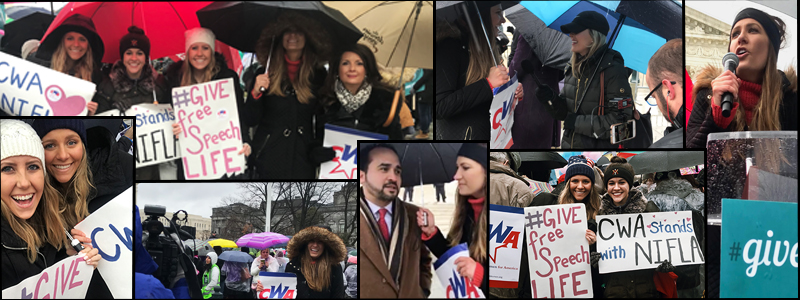
NIFLA v. Becerra Oral Arguments Recap
It was a cold, rainy day in the nation’s capital today, but that didn’t stop your representatives from Concerned Women for America (CWA) from being present inside and outside the United States Supreme Court to stand for freedom of speech and for life. We were there as the Court heard oral arguments in National Institute of Family and Life Advocates v. Becerra.
CWA National Field Director Janae Stracke spoke at the rally on the steps of the Supreme Court where numerous groups stood together to send a message to the Court that the American people are paying attention to this case. Janae praised the work of our CWA of California members who have fought against this law since it was first proposed and energized the valiant crowd, which stood there, despite the challenging weather.
Check out some of the highlights:
As an allied attorney, I was also proud to see our friends at the Alliance Defending Freedom give another stellar performance before the Court. Michael Farris, ADF’s president, argued the case before the justices, and he was calm under intense questioning.
The justice’s interest was evident. Farris started by highlighting the gerrymandering aspects of the case, which are troubling. So troubling they piqued the interest of one of the most liberal members of the court, Justice Elena Kagan. It is evident the State of California wrote this law in such a way as to target pro-life clinics specifically. The state, represented by Mr. Joshua Klein, tried to argue it was a generally applicable law, not intended to target anyone, but in this, he failed in my estimation.
Justice Samuel Alito honed in on it, asking the state, “If you have a law that’s neutral on its face, but then it has a lot of crazy exemptions, and when you apply all the exemptions, what you’re left with is a very strange pattern and, gee, it turns out that just about the only clinics that are covered by this are pro-life clinics. Do you think it’s possible to infer intentional discrimination in that situation?”
The state had to admit that, yes, it would be a fair inference, even as they denied that was the case here.
The burdensome requirements of this law were also front and center. Justice Sonia Sotomayor tried to get the state to answer a simple question about if a clinic that merely wanted to put up a billboard that said, “Pro-Life” with their logo, would be required to put up the disclaimer at issue in the same size font and in multiple languages. Mr. Klein danced around on the question until Justice Alito pinned him down and he admitted that, yes, they would be required to put up the disclaimer on the billboard.
Justice Anthony Kenned was visibly disturbed and had this exchange:
JUSTICE KENNEDY: Do you agree that mandating speech that the speaker would not otherwise give — indeed, does not agree with — alters the content of the message?
KLEIN: Yes, it does, Your Honor.
JUSTICE KENNEDY: All right. So then you are saying on this billboard, the state can require that the message be — the content of the message be altered, even though they are not providing medical services?
Even Justice Sotomayor returned once more to her hypothetical expressed concerns with the state’s position:
JUSTICE SOTOMAYOR: Would it be fair to say — and I still don’t have a full answer to my question — all right, pro-life, nothing else, an unlicensed facility, it meets all of the criteria, has an ad that says just “pro-life” and puts its name. Does it have to give the notice; yes or no?
KLEIN: Yes, if it meets the other criteria. And it’s possible in an as-applied challenge –
JUSTICE SOTOMAYOR: That seems to me more burdensome and wrong because it’s not tied to an advertisement that is promoting medical services.
It is indeed wrong, and it is one of the reasons why the Court should invalidate the statute here and rule for the pro-life clinics.
Continue to pray for this case. A desicion is expected next summer.

